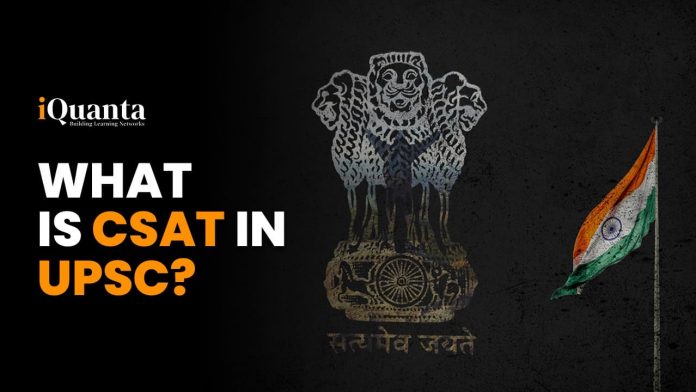In this article we will discuss about what is CSAT in UPSC, it’s significance, structure of the CSAT exam, and strategies for mastering the CSAT.

What is CSAT in UPSC?
The Civil Services Aptitude Test (CSAT), also known as the General Studies Paper-II, plays a pivotal role in the Union Public Service Commission (UPSC) Civil Services Preliminary Examination in India. It is designed to assess candidates’ aptitude and competency in various areas essential for civil service roles, including comprehension, analytical reasoning, decision-making, problem-solving, and interpersonal skills.
The primary objective of the CSAT is for candidates to meet the minimum cut-off score, rather than aiming for exceptional performance. This distinction is crucial as it guides candidates to focus their preparation efforts effectively. Instead of striving for perfection, candidates should prioritize understanding the exam pattern, practicing previous years’ question papers, and strengthening weaker areas to ensure they meet the cut-off requirement.
The CSAT is administered alongside the General Studies Paper-I, which covers topics such as current affairs, polity, economics, history, and geography. Together, these papers offer a comprehensive evaluation of candidates’ suitability for civil service positions, with the CSAT focusing more on aptitude and reasoning abilities.
By qualifying in the CSAT, candidates demonstrate their readiness to advance to the subsequent stages of the examination. Therefore, preparation should emphasize the development of aptitude and reasoning skills, familiarity with the exam format, and practicing under timed conditions to enhance the likelihood of clearing the cut-off and progressing further in the selection process.
Understanding What is CSAT
The main question What is CSAT in UPSC is answered here. CSAT was introduced in 2011 as a part of the UPSC Civil Services Examination reform. It replaced the earlier Preliminary Examination pattern, intending to test candidates on their aptitude and analytical skills rather than mere memorization. This change aimed to assess the candidate’s decision-making ability, problem-solving skills, and comprehension.

Structure of CSAT Exam
The UPSC Preliminary examination consists of two papers, lets understand this to answer What is CSAT in UPSC:
Paper-I (General Studies): This paper is common for all candidates and includes topics such as current affairs, history, geography, economy, environment, and general science. It serves as a screening test for the mains examination.
Paper-II (CSAT): This paper evaluates the candidate’s aptitude and analytical ability. It includes comprehension, logical reasoning, analytical ability, data interpretation, and English language comprehension skills. To move to the Mains examination, one has to clear the minimum cut-off for CSAT.
CSAT Eligibility Criteria
According to the UPSC CSAT Notification 2024 the eligibility criteria of the CSAT exam is mentioned as below:
| Nationality | Indians Only |
| Educational Qualification | Graduate (UG) |
| Number of Attempts | General- 6 SC/ST- Unlimited OBC and PwBD- 9 |
| Age Limit | 21-32 years |
| Age Relaxation | OBC – 3 years SC/ST – 5 years PwBD – 10 years |
Significance of CSAT in UPSC
The CSAT holds immense significance in the UPSC examination process for several reasons which is why it is important to answer What is CSAT in UPSC:
- Screening Process: CSAT acts as a screening test, filtering out candidates based on their aptitude and analytical skills. It ensures that the candidates possess the minimum necessary abilities to handle the challenges of the Civil Services Mains examination.
- Equal Opportunity: CSAT provides a level playing field for candidates from diverse educational backgrounds. It shifts the focus from rote learning to analytical thinking, giving everyone an opportunity to showcase their potential.
- Relevance to Administrative Roles: The skills tested in CSAT are directly relevant to the responsibilities of civil servants. Decision-making, problem-solving, and analytical abilities are crucial for effective governance and policy implementation.
Strategies For Mastering CSAT Preparation
- Understand the Syllabus: Start by thoroughly understanding the syllabus for CSAT. It includes comprehension, logical reasoning, analytical ability, data interpretation, and English language comprehension skills.
- Improve Comprehension Skills: Enhance your reading comprehension skills by reading newspapers, magazines, and editorials regularly. Focus on understanding the central idea, identifying key points, and summarizing passages.
- Practice Regularly: Practicing is the key to mastering CSAT. Solve previous years’ question papers and mock tests to familiarize yourself with the exam pattern and improve your speed and accuracy.
- Develop Logical Reasoning: Practice solving puzzles, logical reasoning questions, and critical thinking exercises. Strengthen your ability to analyze information, identify patterns, and make logical deductions.
- Work on Data Interpretation: Practice interpreting graphs, charts, and tables to extract relevant information. Develop your ability to analyze data, draw conclusions, and solve problems based on numerical and statistical data.
- English Language Proficiency: Brush up on your English language skills, including grammar, vocabulary, and comprehension. Practice reading passages and answering questions to improve your understanding and speed.
- Time Management: Manage your time effectively during the exam. Allocate time to each section based on your strengths and weaknesses. Focus on answering questions accurately while maintaining a steady pace.
- Stay Calm and Confident: Maintain a positive mindset and stay calm during the exam. Trust in your preparation and believe in your abilities. Approach each question systematically and avoid panicking if you encounter any difficult or out of the box questions.
Conclusion
In essence, the answer to What is CSAT in UPSC is that CSAT plays a crucial role in the UPSC Civil Services Examination, testing candidates on their aptitude and analytical skills. Understanding the structure, significance, and strategies for mastering CSAT is essential for aspirants aiming to crack this prestigious exam. By following a structured preparation plan, practicing regularly, and staying focused, candidates can increase their chances of success in CSAT and move closer to their dream of becoming civil servants.
Mastering CSAT requires dedication, perseverance, and a strategic approach. With the right preparation and mindset, aspirants can overcome this hindrance and move forward in their journey towards serving the nation through the civil services. Check out iQuanta CSAT Course 2024 to understand What is CSAT in UPSC and prepare for the same.


